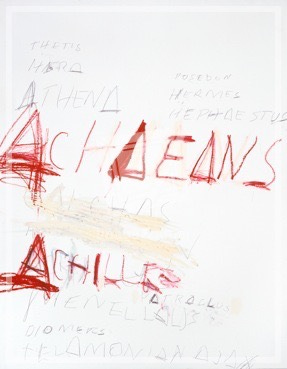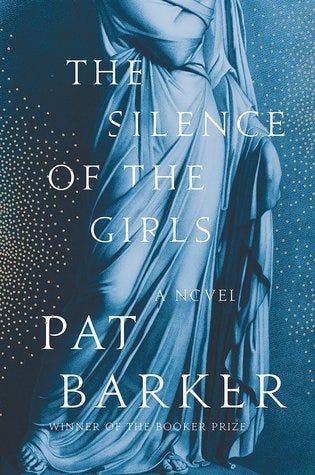Women's stories
Troy appears in some of the oldest and most familiar stories in the world. Paris of Troy steals the beautiful Helen of Sparta. Her husband gets his elder brother, Agamemnon, to gather the Greek army to get her back. Among the Greek warriors is Achilles, son of a mortal and a sea goddess and the greatest fighter of his time.
Homer's Iliad tells the story of the last days of the war, when Achilles quits the fight, but re-engages with a vengeance after his cousin (or lover) Patroclus is killed by the Trojan hero, Hector. Among the characters is sly Odysseus, the font of The Odyssey, the tale of his journey home from the war. The gods at Olympus intervene

for their favorites. Troy falls, and the Greeks obliterate it (according to the tale). One of the Trojan survivors, Aeneas, then journeys to find new lands, as told by Virgil in The Aeneid.
These stories also inspire classic and modern art. One of my favorite series of paintings is Cy Twombley's "Fifty Days at Ilium," based on Alexander Pope's translation of Homer's Iliad. The bright red and savage lines stunned me with their violence, a distillation of a truly pointless war. In the telling of all of these stories, the mortal women are either beautiful or suffer. Among them is Dido, Queen of Carthage, who falls in love with Aeneas and commits suicide after he leaves her.
Spoiler alert: Dido is the inspiration for my Bee Queen, Odide, a central character in Book II of "The Bond" trilogy (for my Pinterest inspiration, see here).
The goddesses that cross paths with the men fare little better. Circe -- daughter of a Titan and banished as a witch to the remote isle of Aiaia -- is depicted as a necromancer and dangerous illusionist. She falls in love with Odysseus, who eventually leaves her (spot a theme?). In classical literature, she is the archetype of the predatory female, possessive and murderously jealous at once.
Women are acted upon -- but never able to speak for themselves.
So it shouldn't be a surprise that some authors are seeing in these myths a fertile new ground from retelling these stories from the point of view of the women -- or goddesses -- involved. I adored Madeline Miller's retelling of portions of the Iliad through the eyes of Circe. In my Goodreads review, I wrote, "Circe is complex, wounded, vicious, perceptive -- a wonderful interpretation of the "monstrous" goddess. Surprising too -- even though the stories are well known, Miller manages to have fresh, interesting observations."

Then last weekend, I was blown away by Pat Barker's The Silence of the Girls, which sees the Trojan War (mostly) through the eyes of Briseis, enslaved by the Greeks and forced to be Achilles' "bed girl" and servant. In my review, I wrote, "Barker has written movingly -- searingly -- about slaughter in her World War I novels, and it's on vivid display here, a frontal assault on the stupidity and pointlessness of war. Briseis both accepts her fate and rails against it, as the slave to the thuggish Achilles -- who, at the same time, is as fastidious about the cultural rules of battle and diplomacy as anyone. Women have no hope here - either they are prizes to be distributed by fathers, brothers, and sons or they fall to the worst sort of degradation as slaves, subject to every abuse. Yet women fight to claim their stories, to see and be seen throughout the book."
I'm keeping these books close (with Emily Wilson's gripping new translation of The Odyssey. Women face these same fates today -- in Yemen, in Iraq, in North Korea, and among those desperate families seeking asylum in the United States. It's both a very contemporary story and the oldest one in the world.
On a news note -- less than a month until The Bond release! Preorder is available here.


